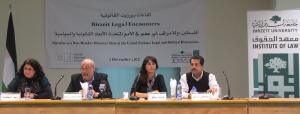Event Reports
Jointly with the Konrad Adenauer Stiftung, the Institute of Law (IoL) organised on Monday, 3 December 2012, a legal encounter on “Palestine as a Non-Member Observer State at the United Nations: Legal and Political Dimensions”.
In his opening remarks, Dr. Mustafa Mar’i, Professor of International Law and Senior Researcher at the IoL, welcomed the audience, commending their proven interest in Palestine’s promoted status as a non-member observer state at the UN. Expressing his hope that the legal encounter be constructive and purposeful, Dr. Mar’i asserted that the large number of participants indicated how vital this development is.
Dr. Abdul Rahman Ibrahim, Chairman of the Political Science Department, overviewed the political dimensions of enhancing Palestine’s status at the UN. Affirming this significant and serious development, Dr. Ibrahim explained that the UN General Assembly (UNGA) resolution “has created a new reality, which necessitates that Palestinians now use a novel Palestinian mechanism and political discourse.” Dr. Ibrahim also commended the high number of votes in favour of Palestine’s application at the UNGA. This new reality requires that national reconciliation and unity of the Palestinian people be an integral part of a new strategy.
Ms. Reem Al-Botmeh, Legal Researcher at the IoL and Assistant Editor of the Palestine Yearbook of International Law, made a briefing note about the relation between law and politics, highlighting consequences on the Palestinian context. She explained that law, including International Law, does not always transcend reality. In contrast with full membership, Ms. Botmeh made clear the concept of an observer membership status. She asserted that the observer member status does not introduce significant changes. Still, it allows Palestine to use some international mechanisms, including the International Criminal Court (ICC) to prosecute perpetrators of crimes that fall under ICC jurisdiction.
Mrs. Diana Boto, former Advisor to the PLO, emphasised the symbolic importance of the UNGA resolution as it embodies a moral victory for Palestinians and urged that the resolution be used effectively.
Enriching the discussion, participants raised questions and made interventions during the legal encounter. Discussants emphasised that, within the legal and political framework, plans and mechanisms should be devised with a view to use the UNGA resolution in the endeavour of building the State of Palestine and ending the Israeli occupation. Finally, Dr. Mar’i highlighted two major conclusions of the legal encounter. Firstly, Palestine’s enhanced status is a remarkable achievement per se. Secondly, a serious, focused and informed national effort should be launched to identify and examine available options as well as to highlight relevant requirements and consequences.
Topics
IBAR: The Interim Benchmark Assessment Report in the EU Accession Process
Thailand's Quest for Democracy and the Rule of Law
Fico pushes through controversial criminal law reform - and thus unites the opposition
Senegal's democracy passes the stress test
Between dialogue and resistance The conflict on the final word in the European judicial order



